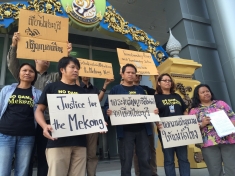Thai Mekong Communities Take Further Legal Steps to Stop Xayaburi Dam
“We have tried to ask the Thai Government, EGAT (the Electricity Generating Authority of Thailand) and Thai Banks to recognize the transboundary impacts of the Xayaburi Dam, but no one takes responsibility. We now come to the Administrative Court today expecting there will be transboundary justice,” said Ms. Ormboon Tipsuna.
Ms. Tipsuna, along with a number of villagers from communities in the north and northeast of Thailand, on behalf of the Thai People’s Network in Eight Mekong Provinces, travelled to the Administrative Court in Bangkok on Wednesday to request an injunction calling for the suspension of the Power Purchase Agreement (PPA) for the Xayaburi Dam, the first dam now under construction on the Lower Mekong River mainstream
The injunction follows on from the decision by the Supreme Administrative Court on June 24th to hear a case brought forward by Thai villagers against the five government bodies responsible for signing the agreement to purchase power from the Xayaburi Dam. The case argues that the PPA is illegal under Thai law, as well as under international law, and that it should never have been signed, as the project’s environmental and social impacts in Thailand were not studied and communities in Thailand were not meaningfully consulted.
While the Xayaburi Dam is under construction in Laos, the injunction’s objective is to prevent further construction and investment towards the project from happening before it’s too late for the people in Thailand and the region.
The Xayaburi Dam will have significant transboundary impacts throughout the Mekong by blocking fish migrations and sediment flows that feed and sustain millions of people in the region. Thailand is set to buy 95% of the power from the project, despite strong opposition from Mekong communities in Thailand, as well as in neighboring countries. The 37 villagers who filed the case with the Administrative Court are representing communities that would be directly impacted by the Xayaburi Dam. Sor Rattanamanee Polkla, a lawyer and Director of the Community Resources Center (CRC), who had been leading the case along with her team at CRC, has stated that “given the transboundary environmental and social risks associated with the project, all construction and further investment should be stopped until the Court has made a decision.”
In the Court’s official ruling in June, it recognized the transboundary impacts of the Xayaburi Dam, stating that the project “may cause impacts to the environment, water quality and quantity, the flow of the water, and the ecological balance of the Mekong Basin as well as other transboundary impacts on riparian countries, particularly local communities in the eight riparian provinces of the Kingdom of Thailand, which may bear extensive impacts…”
The case itself is groundbreaking in recognizing and articulating the transboundary impacts of the Xayaburi Dam, which the government of Laos and project developers have continued to deny. It is also the first case to require a Thai state-owned company building a project overseas to comply with Thai laws. The hope is that this case will not only bring justice for the Mekong River but also set a precedent for the responsibilities of state-owned companies making investments in projects overseas.
- Save the Mekong Press Release in support of Thai Network, October 15, 2014
- Unbalanced Interests: A Review of the Xayaburi Dam's Power Purchase Agreement
News coverage of Injunction to suspend Xayaburi Dam PPA:
- Thai residents along the Mekong demand to halt the construction of the Xayaburi Dam, Eco-Business, October 16 2014
- Mekong Communities Seek Injunction on Xayaburi Dam Deal, The Nation, October 16, 2014
- Mekong Residents File Petition Aimed At Derailing Laos' Xayaburi Dam, Bangkok Post, October 16, 2014




